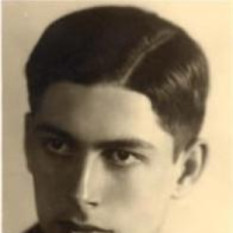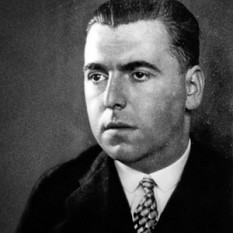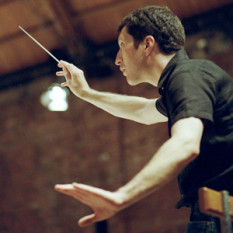Viktor Ullmann (b. 1 January 1898 in Těšín, divided lately between Cieszyn in Poland and Český Těšín in Czechia; d. 18 October 1944 in Auschwitz-Birkenau) was an composer, conductor and pianist.
Viktor Ullmann was born on 1 January 1898 in Teschen, the modern Cieszyn. Both his parents were from families of Jewish descent, but had converted to Roman Catholicism before Viktor's birth. His father, Maximilian, was able as an assimilated Jew to pursue the career of a professional officer in the army of the Austro-Hungarian Empire; in World War I he was promoted to colonel and ennobled.
From 1909 Viktor attended a grammar school (Gymnasium) in Vienna. His musical talents and inclinations soon gave him access to Arnold Schönberg and his circle of pupils. As soon as he had finished school he volunteered for military service.
After deployment on the Italian Front, at Isonzo, he was granted study leave, which he used to obtain an introduction to the study of law at Vienna University. At the beginning of 1918 he was also accepted in Schönberg's composition seminar. With Schönberg himself he studied the theory of form, counterpoint and orchestration. Ullmann was an excellent pianist, although he had no ambitions for a career as a soloist.
In May 1919 he broke off both courses of study and left Vienna in order to devote himself fully to music in Prague. His mentor was now Alexander von Zemlinsky, under whose direction he was conductor at the New German Theatre of Prague (now the Prague State Opera) until 1927. (In the following season, 1927-28, he was appointed head of the opera company in Aussig an der Elbe (Ústí nad Labem), but his repertoire (including operas by Richard Strauss, Krenek and others) was too advanced for local tastes, and the appointment was terminated).
In 1923 with the Sieben Lieder mit Klavier (7 Songs with Piano) there began a series of successful performances of his works, which lasted until the beginning of the 1930s ("Sieben Serenaden"). At the Geneva music festival of the International Society for New Music in 1929, his "Schönberg Variations", a piano cycle on a theme by his teacher in Vienna, caused something of a stir. Five years later, for the orchestral arrangement of this work, he was awarded the Hertzka Prize (named in honour of the former director of Universal Editions). In the meantime he had been appointed conductor in Zürich for two years. As a result of his interest in anthroposophy (founded by Rudolf Steiner) he spent another two years as a bookseller in Stuttgart, but was forced to flee in mid-1933 and returned to Prague as a music teacher and journalist.
During this period he worked with the department of music in Czechoslovak Radio, wrote book and music reviews for various magazines, was employed as a critic for the Bohemia newspaper, lectured to educational groups, gave private lessons and was actively involved in the programme of the Czechoslovak Society for Music Education. At about that time Ullmann made friends with the composer Alois Hába , whom he had known for some time. Ullmann enrolled in Hába's department of quarter-tone music at the Prague Conservatoire, where he studied for two years (1935-1937).
If the works of the 1920s still clearly show the influence of Schönberg's atonal phase (especially the Chamber Symphony Op. 9, the George Songs Op. 15 and "Pierrot Lunaire", Op. 21), the compositions from 1935 onwards are distinguished by independent development of the inspirations received from Schönberg (String Quartet No. 2, Piano Sonata No. 1) and of the controversial issues raised by Alban Berg's opera Wozzeck (the opera Fall of the Antichrist). Dissonant harmonics, highly charged musical expression and masterly control of the formal structure are characteristic of Ullmann's new and from now on unmistakable personal style.
On 8 September 1942 he was deported to the concentration camp at Theresienstadt. Up to his deportation his list of works had totalled 41 opus numbers and contained inter alia a further three piano sonatas, song cycles from various poets, operas and the piano concerto Op. 25, which he finished in December 1939, that is, nine months after the entry of German troops into Prague. Most of these works are missing; the manuscripts presumably disappeared during the occupation. There survive however 13 printed items, which Ullmann published privately and entrusted to a friend for safekeeping.
The particular nature of the camp at Theresienstadt enabled Ullmann to remain active musically: he was a piano accompanist, organised concerts ("Collegium musicum", "Studio for New Music"), wrote critiques of musical events and composed, as part of a cultural circle including Karel Ančerl, Rafael Schachter, Gideon Klein, Hans Krása and other prominent musicians also imprisoned there.
On 16 October 1944 he was deported to the camp at Auschwitz-Birkenau, where on 18 October 1944 he was killed in the gas chambers.
The work he left in Theresienstadt was almost entirely preserved, and comprises - apart from choral works, song cycles and a quantity of stage music - such significant works as the last three piano sonatas, the Third String Quartet, the melodrama based on Rilke's Cornet poem and the chamber opera The Emperor of Atlantis, or The Refusal of Death, first produced in 1975 (the original premier was due to have been held in the autumn of 1944 at Terezin, conducted by Rafael Schachter, but the SS commander noticed the similarities between the lead character and Hitler, and the work was banned). It has been shown in full on BBC television in Britain, and there have been a number of productions in several countries; important productions took place in Bremen and Stuttgart in 1990. It was written on the back of scrap concentration camp records, which were used in the first performance—the performers found this very affecting.
In these works, and particularly in the Emperor and the Cornet, he was concerned with the fundamental questions of his artistic Weltanschauung, now of course having to accommodate the realities of the living conditions in a Nazi concentration camp; the aesthetic problem of transforming already existing material into artistic shape; and the ethical problem of the continuous conflict between spirit and matter.
The most concrete formulation of this discourse, in terms of content, occurs in the "Emperor" opera, with the parable of the Emperor's game with Death for Life. The "game", which concerns nothing less than the total destruction of all human life planned by the Emperor and Death's thwarting of this insane purpose, ends with the ruin of the Emperor and with the vision of a new understanding between life and death.
With the musical formulation of this subject, presumably connected to the contemporary situation, Viktor Ullmann created a timeless paradigm of how through the positive powers of humankind the inhumanity of every tyrannical regime can be overcome.
.
You can find information through the best music search engine - Muzlan.top 😊All materials on request "Viktor Ullmann" are available on page Viktor Ullmann
Yes of course. You can listen tracks on the page Viktor Ullmann
Yes of course. You can download tracks on the page Viktor Ullmann
This page is found by queries: Viktor Ullmann mp3 download, Viktor Ullmann track minus, Viktor Ullmann remix, Viktor Ullmann song download, Viktor Ullmann songs download




